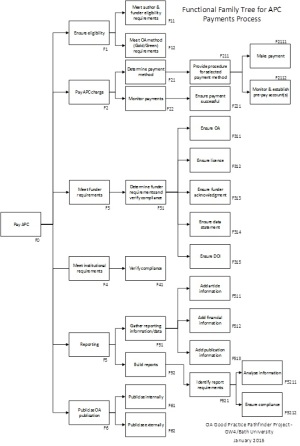The last few months have seen a number of outputs from the GW4 Pathfinder group based around models of payment, from off-setting, to the current state of play with APC intermediary services to a wish list for the Ultimate Prepayment Account.
Our Exeter colleague, Finlay Jones, has been examining the situation around third party  intermediary services for APC payments. We assumed this would be a growth area when we started this Pathfinder Project, hot on the heels of the Jisc APC project.
intermediary services for APC payments. We assumed this would be a growth area when we started this Pathfinder Project, hot on the heels of the Jisc APC project.
As is often the case in the Open Access landscape, this has changed dramatically. There has been a significant cooling round the idea of establishing intermediaries. As Finlay notes in his blog post, ‘the focus on savings has thus shifted. Any savings that we as a community might make now come from lowering, or controlling, the total cost of publication, rather than directly from removing administrative burden as was thought a little over a year ago at the commencement of the project.
This ultimately changed the overall focus of our project, and we’ve since moved towards looking at off-setting, in tandem with material emerging from the Jisc. We have a brief report in progress on the key issues with off-setting at the moment, and the main models available in the UK.
Back to the everyday functions of processing APCs, and we’re largely dealing with invoice payments. We released a FAQs for Publishers guide which gave a few of the common problems faced by institutions paying APCs. Encouraging use of a generic email address, for example, has also been included in a more recent Jisc guide of the Top Ten Tips for Implementing Open Access, although more from the perspective of communications with researchers.
Our University of Bristol colleagues have been putting together an ‘Ultimate Prepayment Account’ wish list, based on their experiences with the APC deals they’ve encountered to date. Their key issues are around who can access and authorise prepay accounts, how to monitor and report on spend, and a focus on the authors’ experience with the account.
The next few months will see us hold a workshop on Good Practice for APC Payment Management (18th November at the EngineShed in Bristol). Join us there to discuss payment practices from institutional, publisher and third party perspectives. We also plan to release some of the work we’ve undertaken around streamlining financial reporting and on the wider market effects of prepayment deals.
